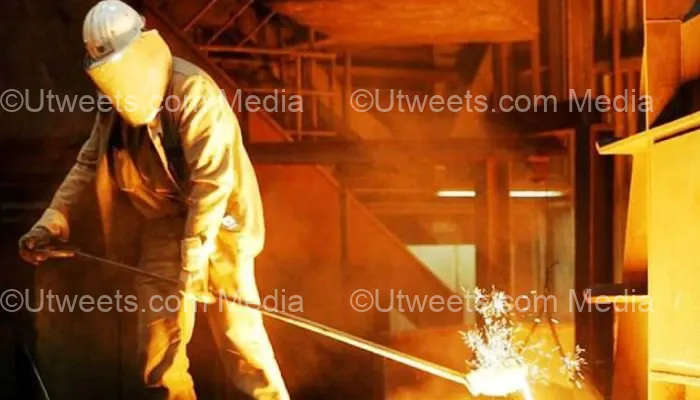BE .CAREFUL PLEASE. SEE V!D£0 .CLIPS/PHOTOS OF .LATEST .DISEASE .K!LLING .PEOPLE .NOW, SAFE. LIVES. READING THIS.As Nigerians move to the UK seeking better opportunities, it’s essential to consider not just salary, working hours, workplace culture, or benefits, but also the safety risks associated with certain jobs. Navigating the job market in a foreign country comes with its unique challenges, and prioritising safety is a crucial part of making informed career decisions. ...READ THE FULL STORY FROM SOURCE ...READ THE FULL STORY FROM SOURCE
According to jmw, here are the top 10 most dangerous jobs Nigerians should be cautious about when working in the UK.
1. Construction
Construction remains the most perilous profession in the UK, and for good reason. Heavy machinery, cranes, and high scaffolding contribute to the hazards workers face every day. Fatalities in this sector are alarmingly frequent, with 39 recorded deaths in 2020 alone. The risks include falling objects, improper handling of tools, and unstable surfaces. With four times the fatality rate of the national average for all industries, construction workers must undergo rigorous training and use appropriate Personal Protective Equipment (PPE) to mitigate the risks. Nigerians entering this field should prioritise employers who adhere strictly to safety protocols and offer comprehensive insurance coverage to protect against workplace accidents.
2. Farming
While farming is an essential part of the UK economy, agricultural jobs can be deceptively dangerous. Operating heavy machinery like tractors, responsible for 44% of farming accidents, poses significant risks due to the possibility of tipping and other mechanical failures. Additionally, poor ventilation in grain silos can lead to suffocation, and handling chemicals like pesticides can cause severe long-term health issues. Farmers also face unpredictable risks from animals, which can inflict injuries. Nigerians considering work in agriculture should ensure that they undergo comprehensive safety training and avoid taking shortcuts when operating machinery or working with hazardous chemicals.
3. Manufacturing
The manufacturing sector, which spans various industries such as metalworking, food production, and textiles, exposes workers to a wide range of hazards. Risks in this field include accidents with heavy machinery, sharp tools, and exposure to hazardous chemicals. For example, metal stamping and forging require precise handling of heated materials, while wood and food manufacturing involve dangerous equipment and chemicals. Injuries can range from amputations to chemical burns. Nigerians seeking employment in manufacturing should prioritise companies that offer extensive safety training, ensure regular equipment maintenance, and have clear safety procedures in place.
4. Care and Nursing
Healthcare and care work, especially in the wake of the COVID-19 pandemic, has seen increased demand, but it also comes with significant risks. Frontline workers in this sector frequently face exposure to infectious diseases, long working hours, and physical strain from lifting and moving patients. This can lead to both physical injuries and mental stress. Nigerians pursuing care and nursing careers should seek employers who provide adequate PPE, mental health support, and enforce manageable working hours to help protect the well-being of staff.
5. Waste Management
Waste management is a vital sector but comes with inherent risks. Refuse operators handle industrial, commercial, and residential waste, often working with hazardous substances. Mishandling compactors and other machinery can cause severe injuries, and lifting heavy objects frequently leads to musculoskeletal issues. Though fatalities in this field have declined, waste management remains a high-risk profession. Nigerians entering this field should ensure they are trained in handling equipment safely and demand employers enforce strong safety standards to minimise potential injuries.
6. Scaffolding and Roofing
Working at heights is an inherently dangerous task, and scaffolding and roofing rank among the riskiest jobs. In 2021/22, falls accounted for nearly 29% of all workplace fatalities. The risks include unstable surfaces, slippery rooftops, and poorly maintained scaffolding. Workers in these sectors must adhere to strict safety regulations and use fall protection gear. Nigerians entering the scaffolding and roofing sectors should ensure that employers prioritise height safety training, provide well-maintained equipment, and regularly inspect work sites for hazards.
7. Emergency Services
Emergency services such as paramedics, firefighters, and police officers face daily life-threatening situations. Aside from the risks posed by infectious diseases, these workers deal with hazardous chemicals, physical strain from patient handling, and high-stress environments. For example, firefighters risk injury or even death when responding to fire emergencies. Nigerians considering careers in emergency services must not only focus on physical resilience but also prioritise mental health support and awareness of stress management to help cope with the demands of the job.
8. Motor Vehicle Repair
The motor vehicle repair industry is full of risks, with mechanics and repair workers constantly exposed to tools, flammable materials, and heavy equipment. Accidents can occur from falling vehicles, slips, trips, and improper handling of car lifts. Additionally, exposure to fuel and other chemicals increases the likelihood of burns or poisoning. Nigerians entering the motor vehicle repair industry should seek out employers that provide proper safety training, supply PPE, and enforce safety protocols to prevent injuries.
9. Lorry Driving
Driving heavy goods vehicles (HGVs) is deceptively dangerous. While many view lorry driving as a low-risk profession, the reality is that long hours on the road increase the likelihood of fatigue-related accidents. In addition to physical risks, lorry drivers are also at greater risk for health issues such as obesity and high blood pressure, which can impair their driving abilities. Alarmingly, a significant percentage of HGV drivers admit to falling asleep behind the wheel. Nigerians entering the lorry driving profession should ensure they undergo regular health checks and avoid excessive working hours to stay safe on the road.
10. Office Work
Office jobs, while seemingly safe, are not without their own hazards. Prolonged sitting can lead to musculoskeletal problems, while repetitive motions or poor ergonomics can cause chronic pain. Additionally, high-stress work environments contribute to mental health issues such as anxiety and depression. Nigerians in office roles should focus on adopting ergonomic practices, such as using standing desks and practising the 20-20-20 rule for screen breaks. Employers should also provide resources for managing stress and promoting employee well-being.…READ THE FULL STORY FROM SOURCE ↔️



